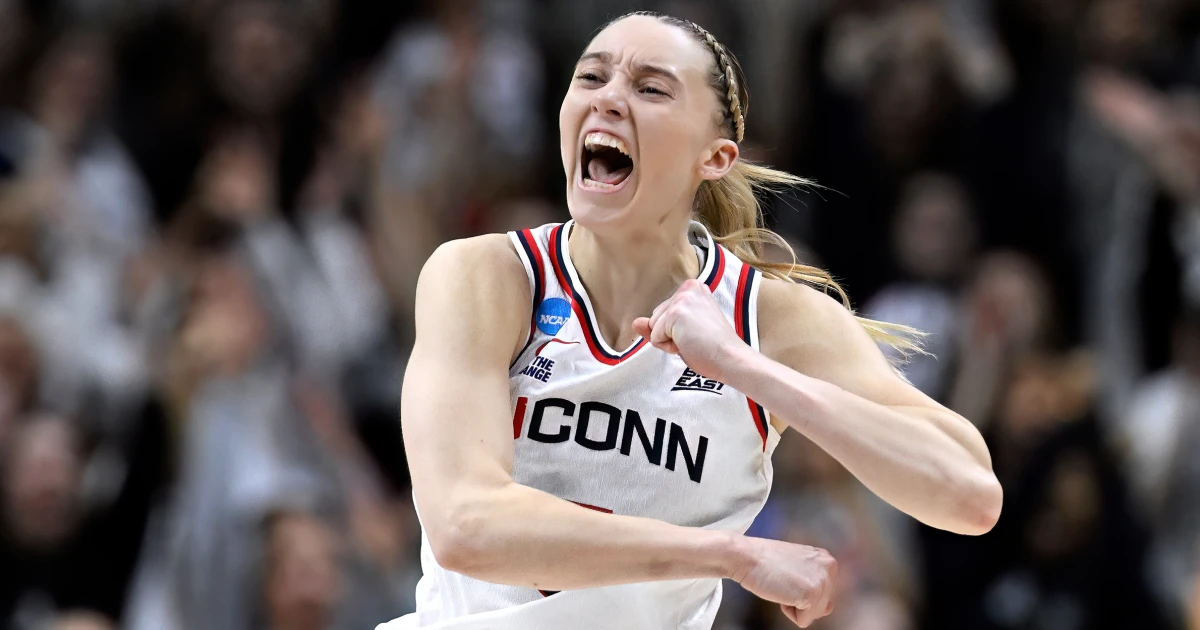If the basketball gods had been benevolent, then hoops fans would have been in for a treat in this year’s NCAA women’s basketball tournament. Had the dominoes fallen in the right places, the game’s two best players, University of Southern California guard JuJu Watkins and University of Connecticut guard Paige Bueckers, would have met in Friday’s Final Four. If Bueckers wins tonight, Sunday will be her last chance to win a national title.
The basketball gods weren’t kind, and the clash of the two college superstars wasn’t to be.
But the basketball gods weren’t kind, and the clash of the two college superstars wasn’t to be. First, USC and UConn were put in the same bracket, which made a Final Four matchup impossible. Then, on top of that, Watkins suffered a devastating, season-ending knee injury in USC’s second-round win against Mississippi State. USC and UConn did eventually meet in the Elite Eight round, but fans were robbed of what could have been a historic game if the USC star had been healthy. Not surprisingly, the Huskies beat the Trojans, 78-64, behind Bueckers’ 31 points.
Bueckers vs. Watkins would have been the most anticipated matchup in either the men’s or women’s bracket, a contest between the sport’s most recognizable stars. It would have meant all the more this year, which has not produced the kind of Cinderella run that gives casual fans — and those who haven’t filled out brackets — a reason to keep watching beyond the tournament’s first weekend.
We didn’t get March Madness this year as much as we got March predictability. In the men’s and women’s tournaments, there have been some good games but few surprises or upsets. With the UCLA Bruins, the South Carolina Gamecocks, the Texas Longhorns and the UConn Huskies, the women’s Final Four features three No. 1 seeds and one No. 2 seed. (Watkins’ Trojans were a No. 1 seed.) The men’s Final Four features four No. 1 seeds, the first time that’s happened since 2008.
As it has been for several seasons now, the women’s tournament is the one with the bigger star power and the better storylines. The women’s game features players who — partly because they stay in college longer — generally have more name recognition than their male counterparts. The women’s championship has set viewership records in the past two seasons by nearly doubling the number of fans who tuned in year over year. Almost 5 million people watched the women’s championship in 2022, 9.9 million watched in 2023 as Angel Reese’s LSU Tigers defeated Caitlin Clark’s Iowa Hawkeyes, and 18.9 million watched the much-hyped battle in the 2024 championship when South Carolina avenged its 2023 Final Four loss against Clark’s team.
As it has been for several seasons now, the women’s tournament is the one with the bigger star power and the better storylines.
The semifinal games during those years have also garnered great ratings. If the growth of college basketball is measured by how rapidly the viewership increases, then there’s no question that the women’s game is having a cultural moment that the men’s game is not. Anyone asking why need look no further than what’s always driven fervent viewership of sports: the rivalries. One of the storylines of the previous two tournaments, for example, was whether Iowa’s Clark could best South Carolina’s Aliyah Boston or LSU’s Reese to win a title. Clark fell short each time.
Even though we didn’t get a Bueckers-Watkins matchup, there are still important matchups to watch. For example, can Gamecocks coach Dawn Staley, the first Black head coach of a Division 1 women’s college basketball team to win multiple NCAA women’s championships, win another championship at the expense of UConn coaching legend Geno Auriemma, who has won 11?
For better or worse, those storylines have fed the surge in interest in women’s college basketball. It’s also where many fans hoped this year’s tournament would land, with a Watkins-Bueckers battle to keep the streak of legendary rivalries going. The problem is that many of these “rivalries,” at least the idea that they’re bitter, are projected onto the athletes, who, despite being fierce competitors, don’t see themselves as foes. As sports fans, we all need something to root for, which often means we identify a heel who needs to be vanquished.
Enter Bueckers, who in her senior season is averaging 19 points per game, shooting 61.3% from the field and leading all NCAA women with 4.8 assists per game. She’s expected to be the first pick in the WNBA draft. She has won almost every award possible, from a Naismith to three AP All American honors. All she’s missing is the championship, and a foe to annihilate along the way.
That, perhaps, is as it should be. As much as fans enjoy rivalries and as interesting as they make the game, there’s a strong argument that women like Watkins, who won the AP Player of the Year award, and Bueckers, deserve to have their moments without being pitted against each other in fans’ imaginations.
Keith Reed
